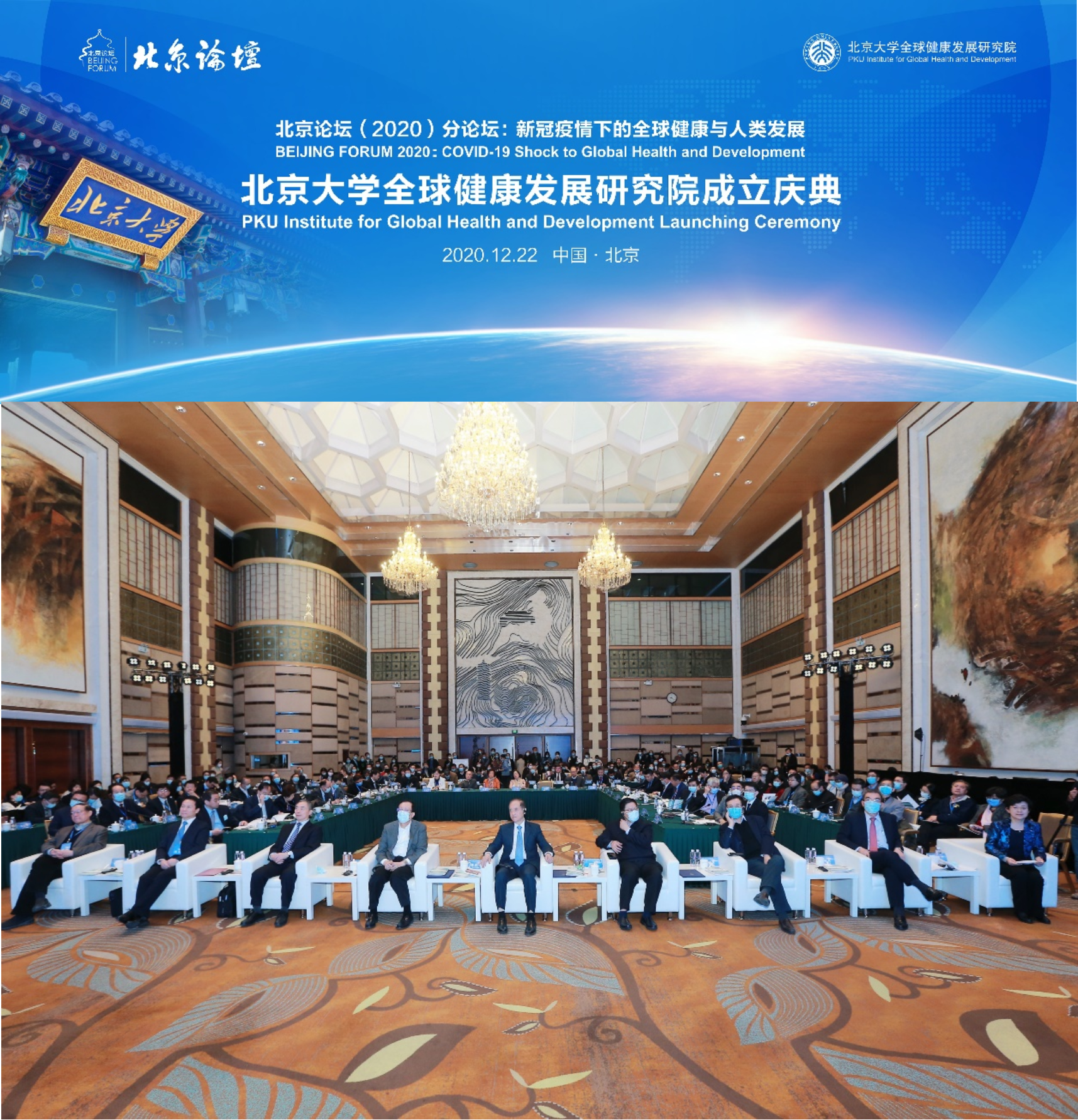
The global spread of COVID-19 poses an unprecedented challenge to global health security, and the fate of humanity has never been more closely intertwined. It is thus urgent to find solutions to the crisis through global cooperation.To this end, Peking University Institute for Global Health and Development (PKU-iGHD) was officially launched on December 22, 2020, along with Beijing Forum 2020:COVID-19 Shocks to Global Health and Developmentat.
PKU-iGHD aims to mobilize the resources of PKU’s humanities and social sciences disciplines including public health, clinical medicine, economics, international relations, etc., and to create a high-end research institution to meet the challenges of global health and human development. Its establishment has unprecedented timeliness, far-reaching significance and importance.
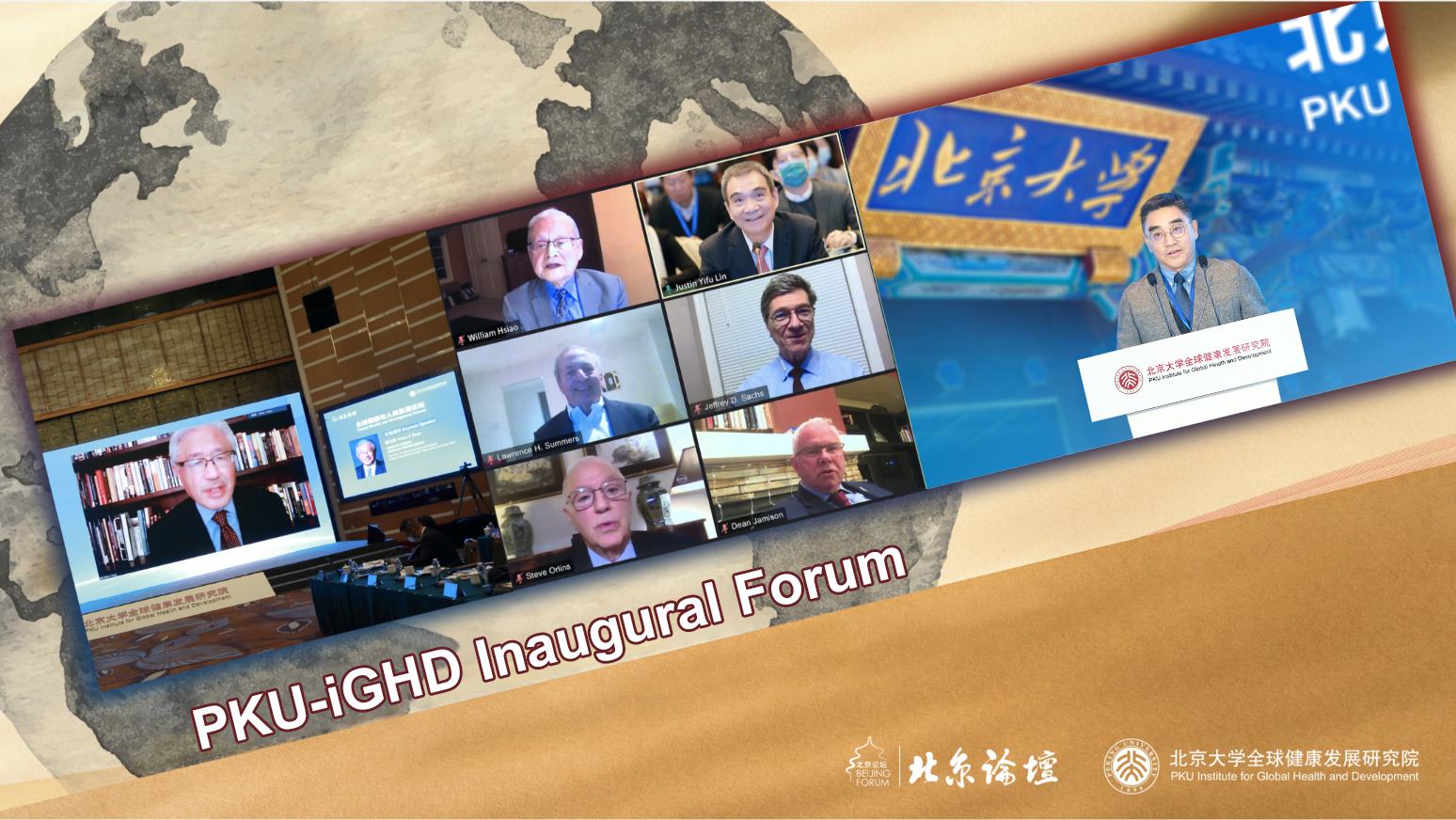
Launching Ceremony
The launching ceremony was presided over by Qiao Jie,executive vice president of Peking University Health Science Center.
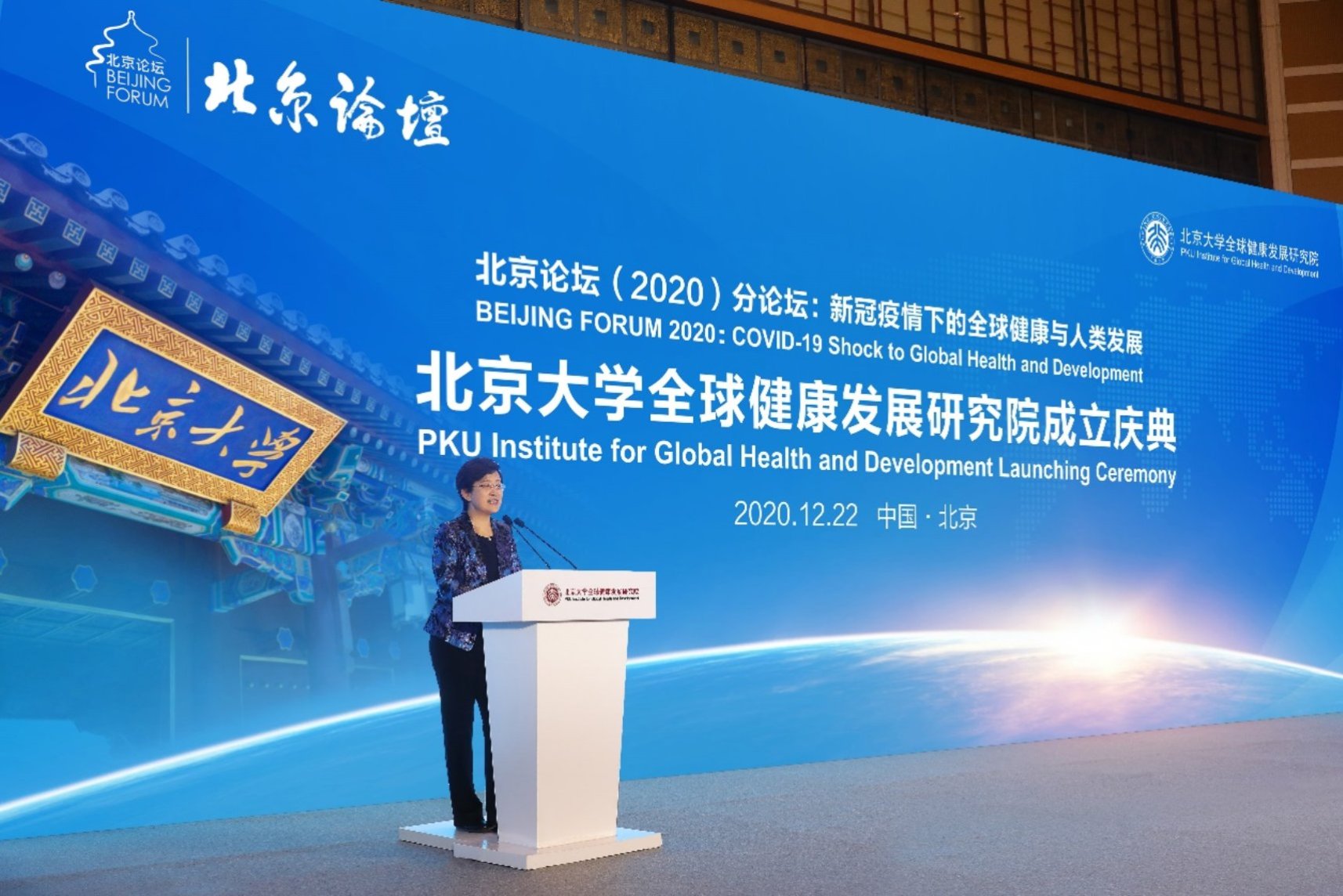
QIAO Jie hosted the launching ceremony
Zhan Qimin, executive vice president of Peking University, announced the establishment of PKU-iGHD. He said that Peking University aims to better integrate multi-discipline resources in public health, economic management, international relations and other related fields, and to shoulder the responsibility of making contribution for a global community of health for all.

ZHAN Qimin Announced the Establishment
The launching ceremony and the forum brought together prominent scholars and experts from China and abroad, extending warm congratulations and sharing ideas in depth how to promote global health and development in the context of the pandemic.
Chen Zhu, vice chairman of the NPC Standing Committee, former minister of Health of China and member of Chinese Academy of Sciences, expressed his view that in the context of globalization and national development, the establishment of PKU-iGHD is an important step for Peking University to train high-level talents who would be future leaders for research in global health and international governance. This is also a demonstration of Peking University’s vision to be a world-class university.
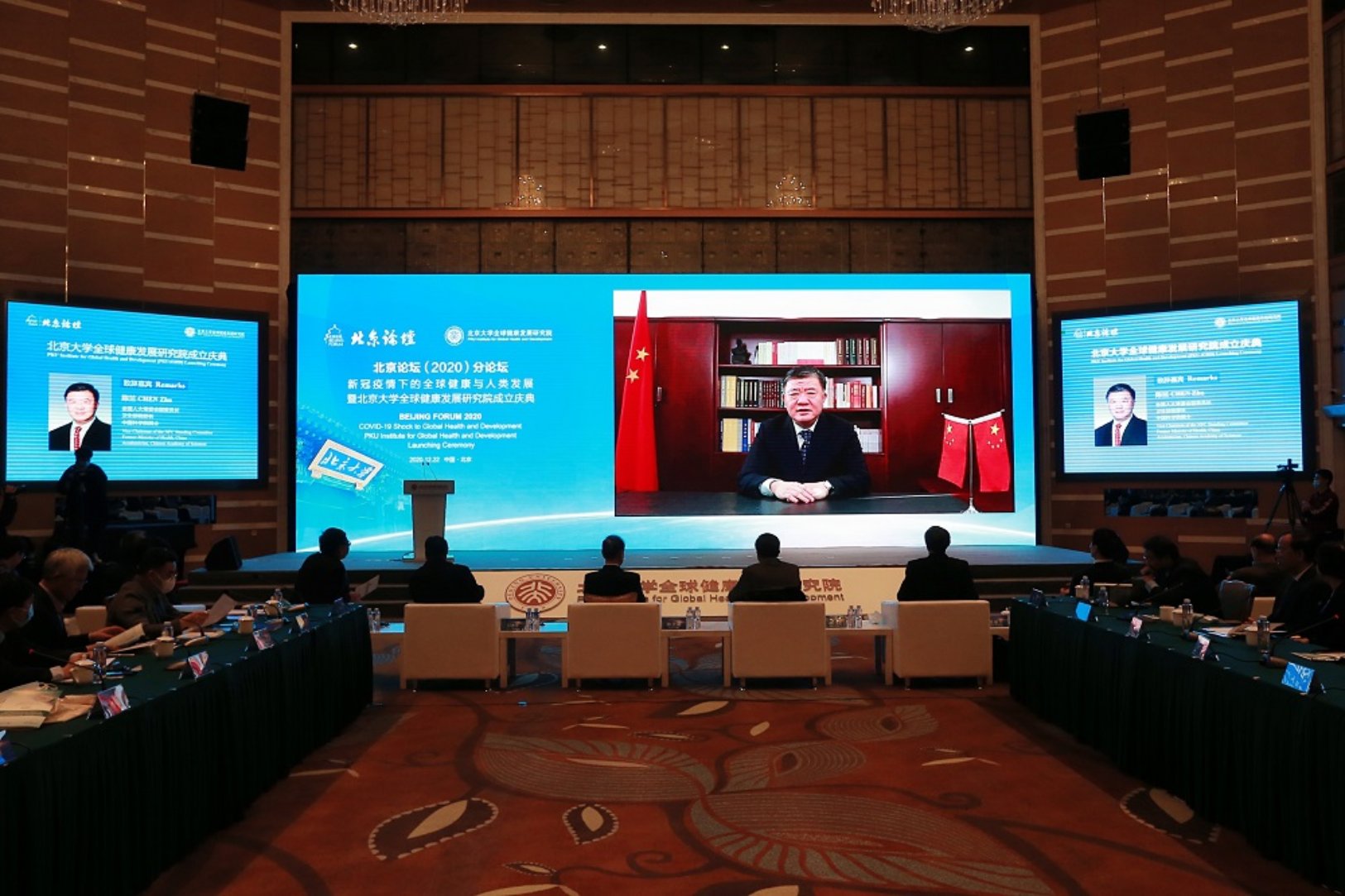
CHEN Zhu at Speech
Han Qide praised the establishment of PKU-iGHD to be comply with the Chinese old saying of “right timing, favorable location and harmonious people”. He hopes PKU-iGHD will be a flagship hub organization, which can make full use of the advantages of Peking University’s intellectual resources in all aspects, and to contribute to the advancement of human health and global development.
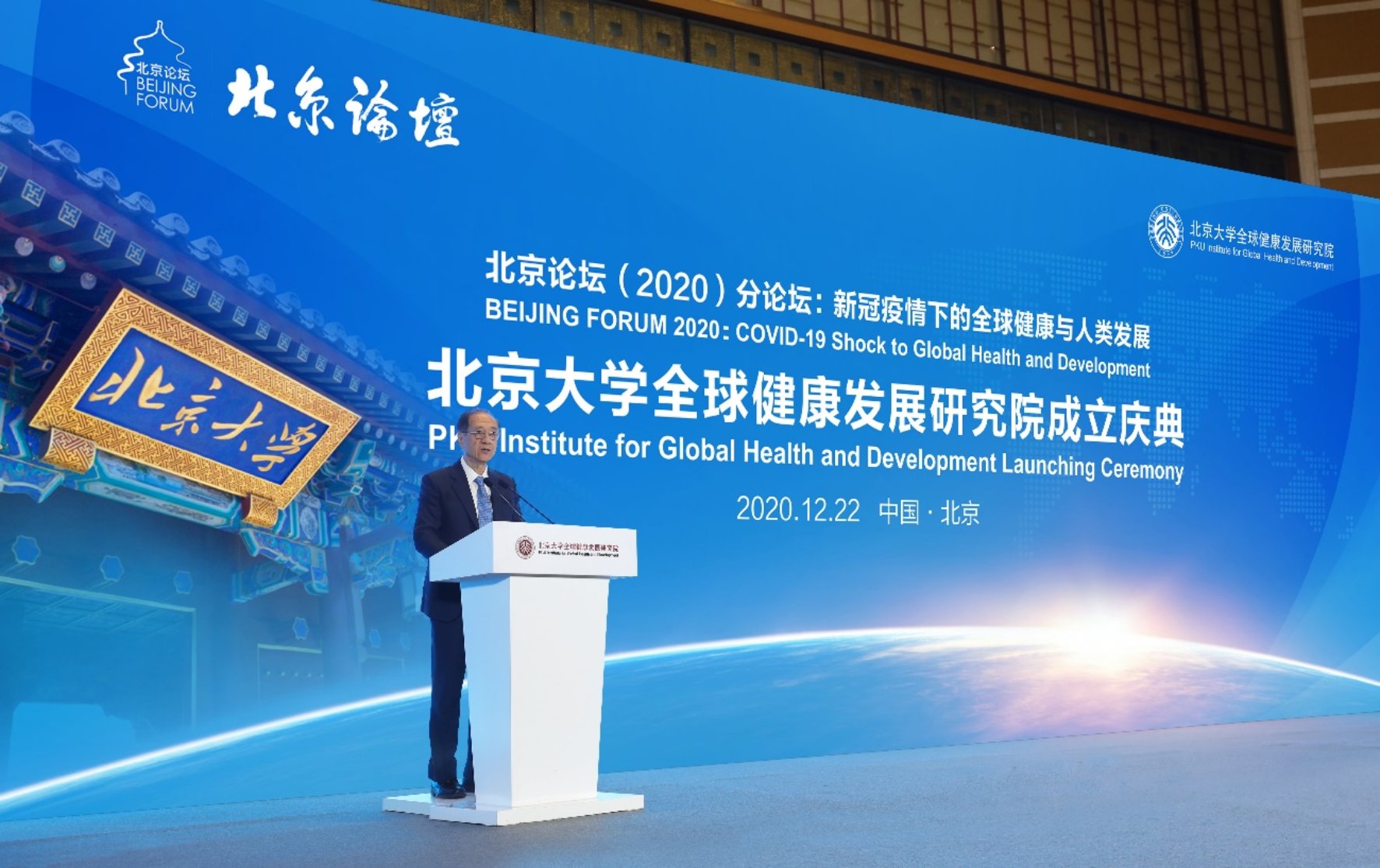
HAN Qide at Speech
William Hsiao, co-chair of the Advisory Council for PKU-iGHD, K.T. Li Professor of Economics Emeritus of Harvard School of Public Health, and member of the US National Academy of Medicine, emphasized that with the advantages of Peking University and China, PKU-iGHD should be an interdisciplinary research institute focusing on health and development. It should take international cooperation as the premise, and build on three intellectual pillars: economics, public health, and international relations, and will be playing a major and leading role in the world.
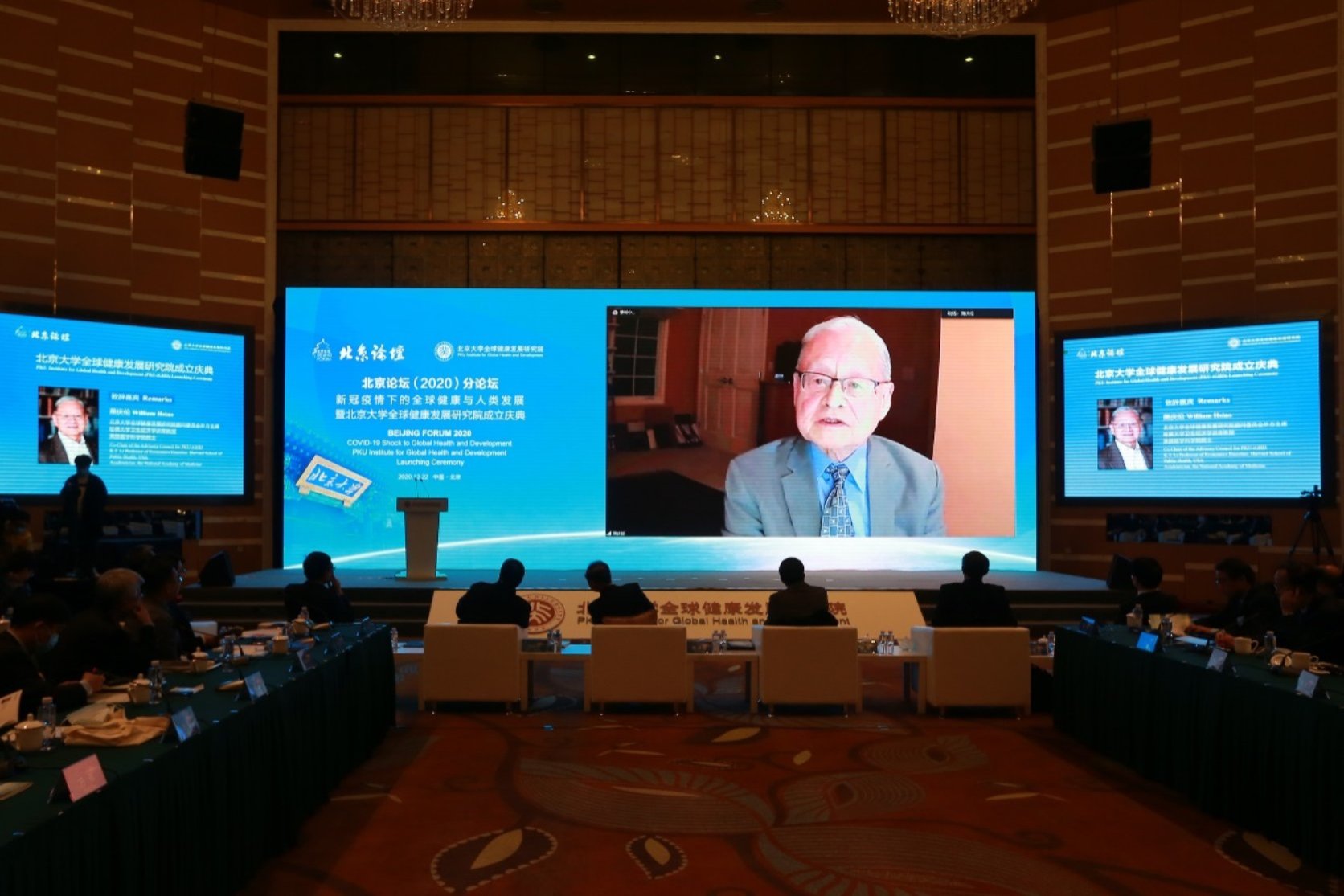
William Hsiao at Speech
Ren Minghui, assistant director-general of WHO, sent his sincere greetings through video. He emphasized that global health is an important agenda of global development and it requires global cooperation. WHO holds the concept that enjoying health is a basic right for everyone and WHO has great expectation for future partnership with PKU-iGHD for the global health development.
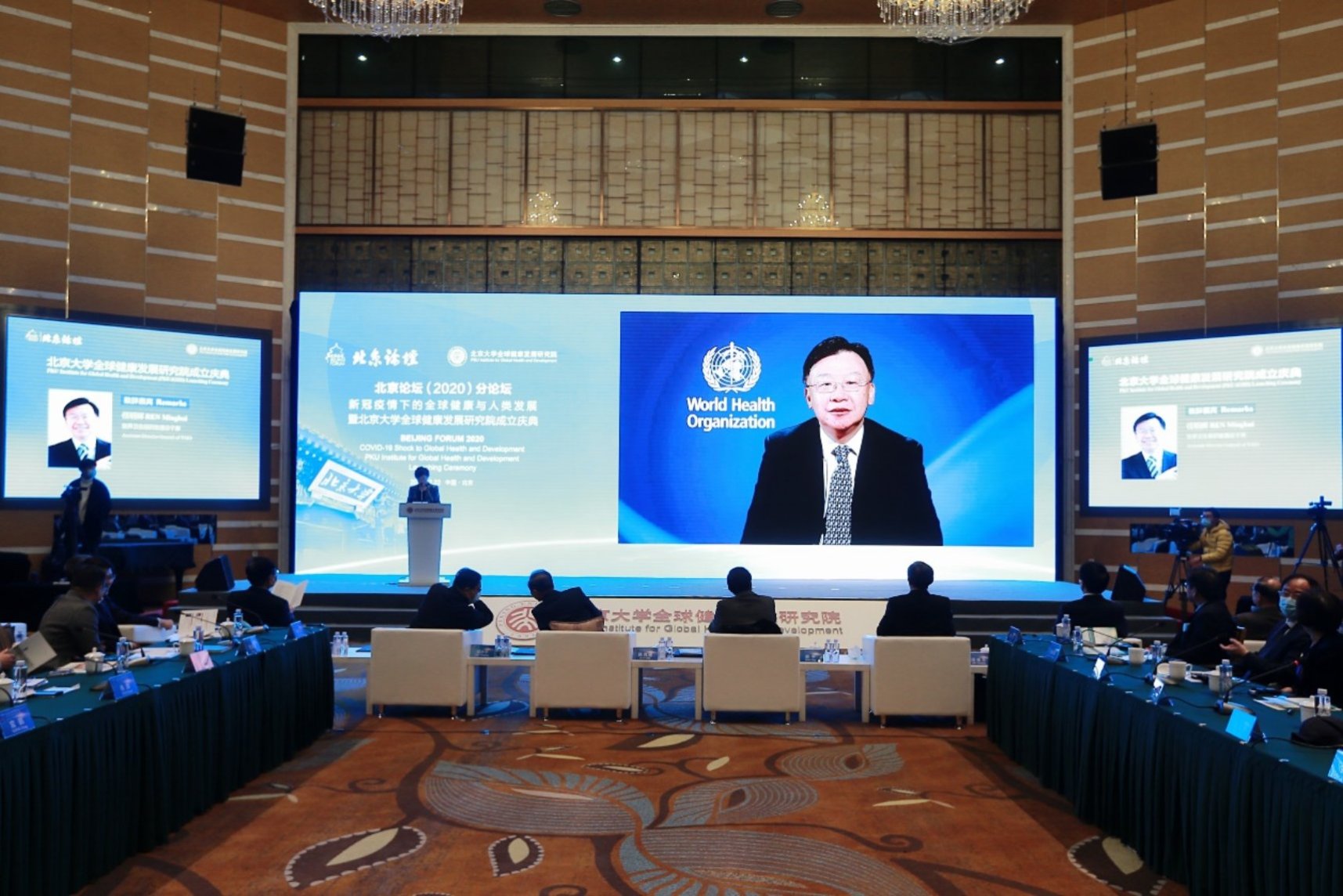
Ren Minghui at Speech
Mark McClellan, Robert J. Margolis professor of Business, Medicine, and Policy of Duke University and former commissioner of FDA of the USA, called for global cooperation in policy and technology to reduce the adverse effects of the current and future pandemic and expected PKU-iGHD to contribute more effective ideas to promoting global cooperation.
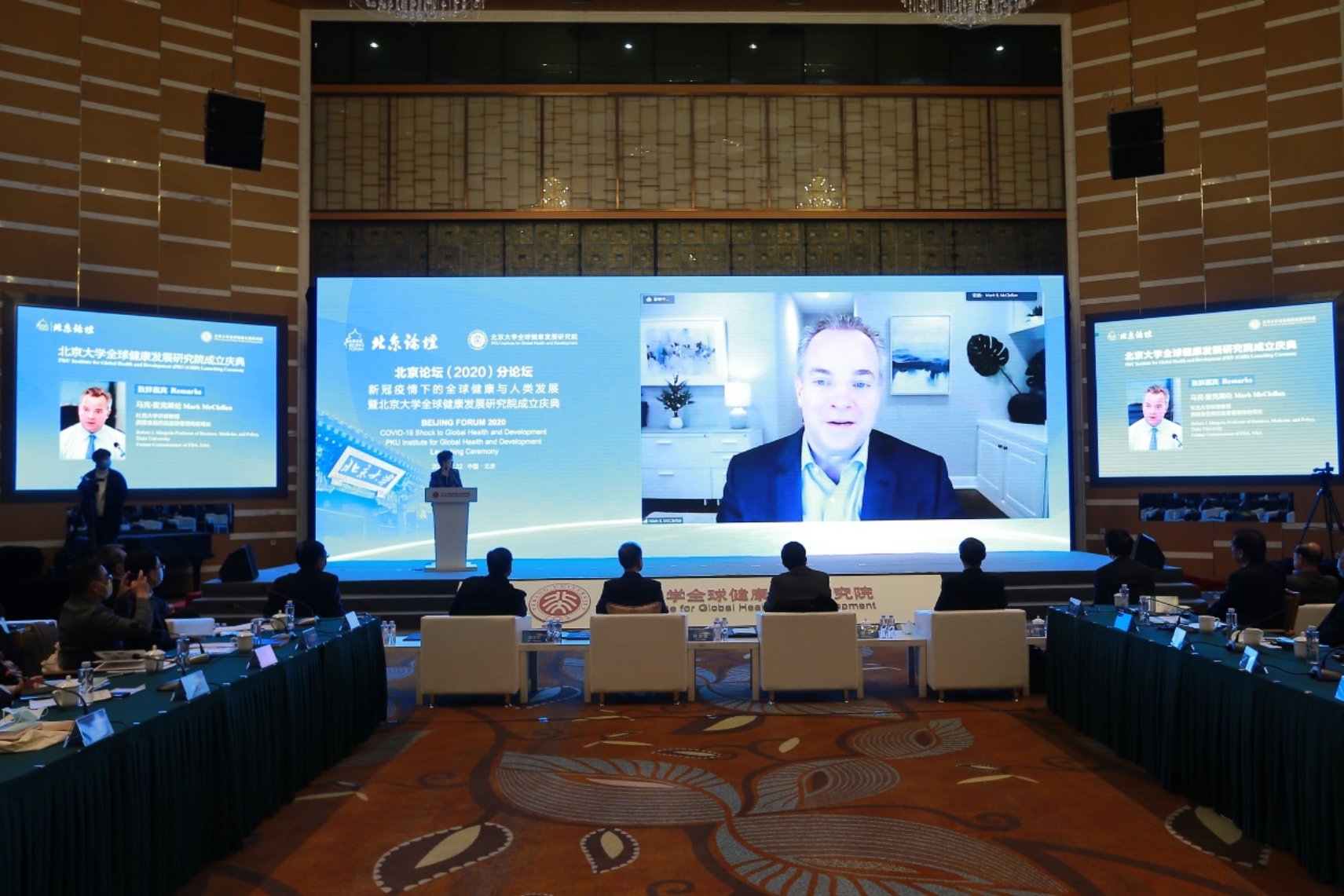
Mark McClellan at Speech
Christopher JL Murray, professor and chair of Health Metrics Sciences, director of Institute for Health Metrics and Evaluation of University of Washington, put forward five aspects about how he thinks COVID-19 will change global health in the coming years, such as the way how the global community thinks of the pandemic preparedness, increased focus on non-communicable diseases, etc. He reminded that we should be prepared for the future and give consideration to broader implications, e.g. the economic effects.
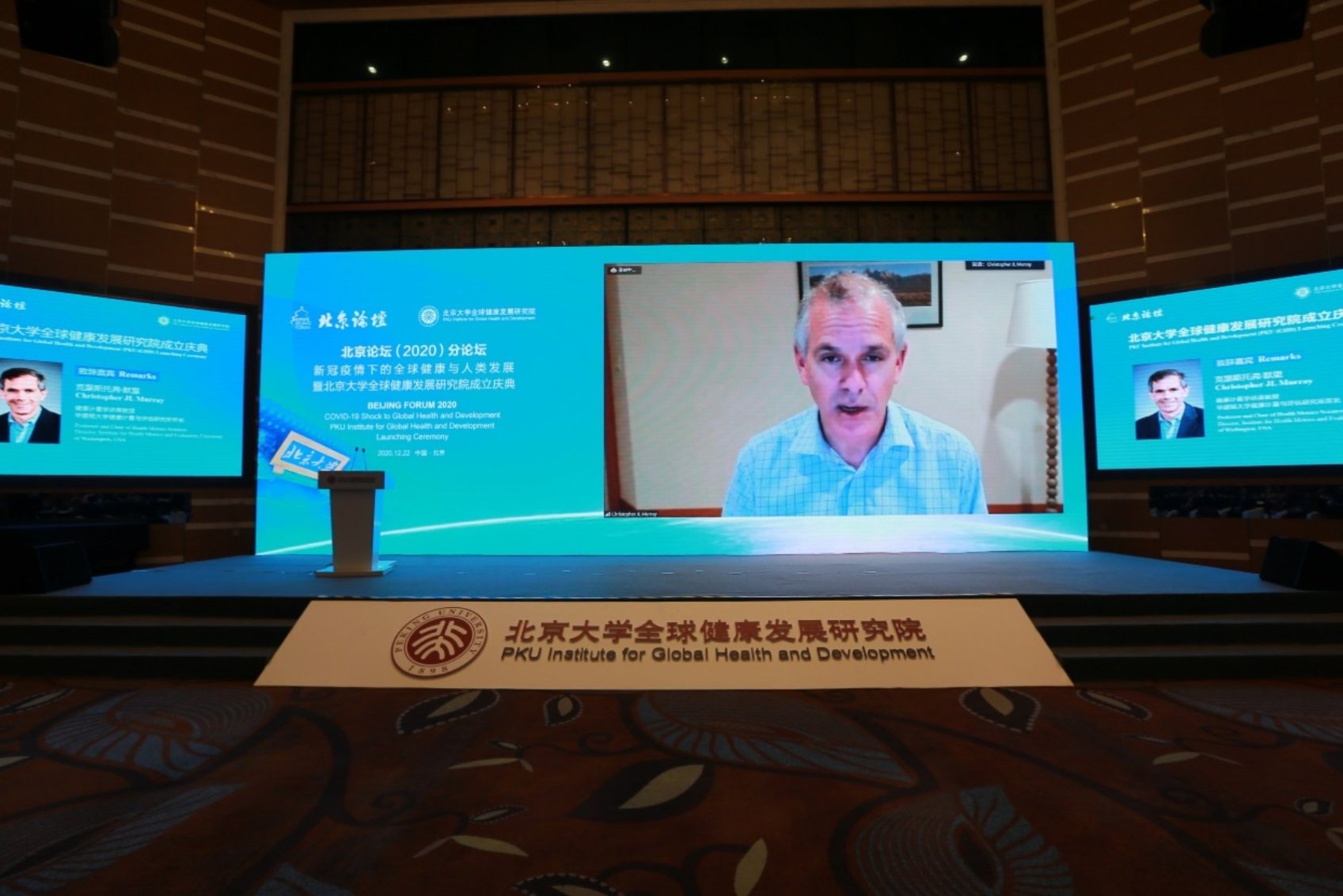
Christopher JL Murray at Speech
Margaret Chan, dean of Tsinghua University Vanke School of Public Health and former director-general of WHO, expressed her expectation that PKU-iGHD will promote China to play a greater role in the global healthy development. As the inaugural dean of the Tsinghua University Vanke School of Public Health, she looks forward to very close cooperation with PKU-iGHD and other universities at home and abroad, and to have long-term investment in education and training of new talents and future leaders in health and development.

Margaret Chan at Speech
Gordon Liu, dean of PKU-iGHD, Boya distinguished professor of Economics in PKU National School of Development, and member of China State Council Health Reform Advisory Commission, made a speech as the inaugural dean of PKU-iGHD. He said that this role is of great responsibility, and he believes that the launching of PKU-iGHD is the action taken by the PKU scholars to promote the construction of a community with a shared future for mankind. The future development of PKU-iGHD should rely on the existing interdisciplinary disciplines of Peking University, and PKU-iGHD will constantly improve the research strength and global vision of the research team and make greater contribution to the healthy development of humans with the wisdom of Chinese scholars. He also extended his gratefulness to the invited speakers and guests for their long-term support and cooperation.

Gordon Liu at Speech
After the opening speeches, HAN Qide, Honorary President of the Chinese Association for Science and Technology, QIU Shuiping, Chair of the Peking University Council, and HAO Ping, President of Peking University, presented letters of appointment to PKU-iGHD leaders: Gordon Liu as the dean; ZHENG Zhijie, ZHANG Haibin and QIN Xuezheng as associate deans; ZHAN Qimin, as Chairman, the Board of Directors; HAN Qide and William Hsiao as Co-Chairs of Advisory Council.
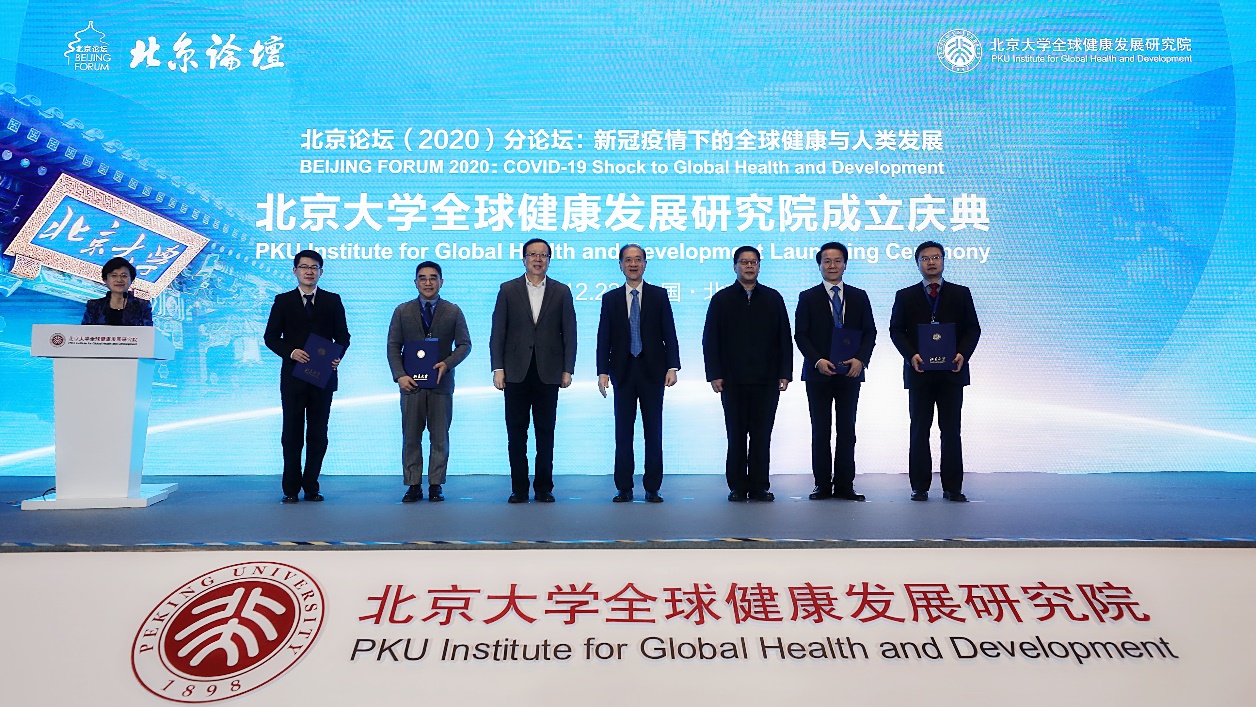
QIAO Jie, QIN Xueshong, Gordon Liu, HAO Ping, HAN Qide, QIU Shuiping, ZHAN Qimin, ZHANG Haibin
Beijing Forum:Covid-19 Shocks to Global Health and Development
QIN Xuezheng, associate dean of PKU-iGHD introduced and moderated the Keynote Speeches.
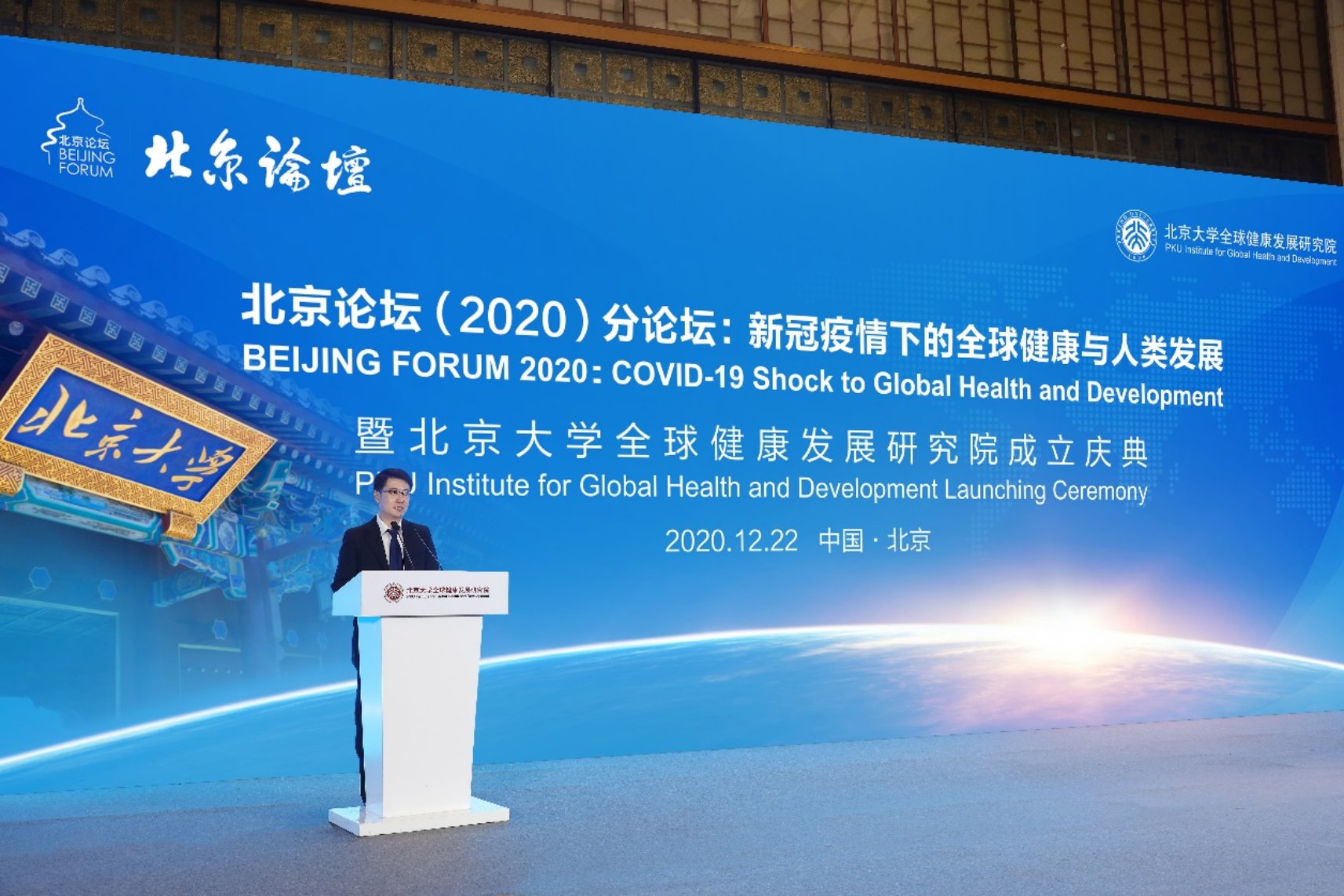
QIN Xuezheng Moderated the Keynote Speeches
The first speaker is Justin Yifu Lin, dean of PKU Institute of New Structural Economics, dean of PKU Institute of South-South Cooperation and Development, and honorary dean of PKU National School of Development. From the perspective of new structural economics, he elaborated that to achieve a good health system, a country should have economic development to raise the income of the people, and the market and the government should work together to make healthcare available and affordable to the people.

Justin YF Lin at Speech
The second speaker is Lawrence H. Summers, who is the president emeritus of Harvard University and former US treasury secretary. He called for global cooperation at the government level, and suggested a goal of vaccination universally available by the end of 2022. He also emphasized that there should be a common global commitment to restore convergence between developing and developed countries, and the establishment of an effective global capacity to meet the next pandemic. He said, “There is no more important act – as history will judge it – than China and the US cooperating together to meet this challenge.”
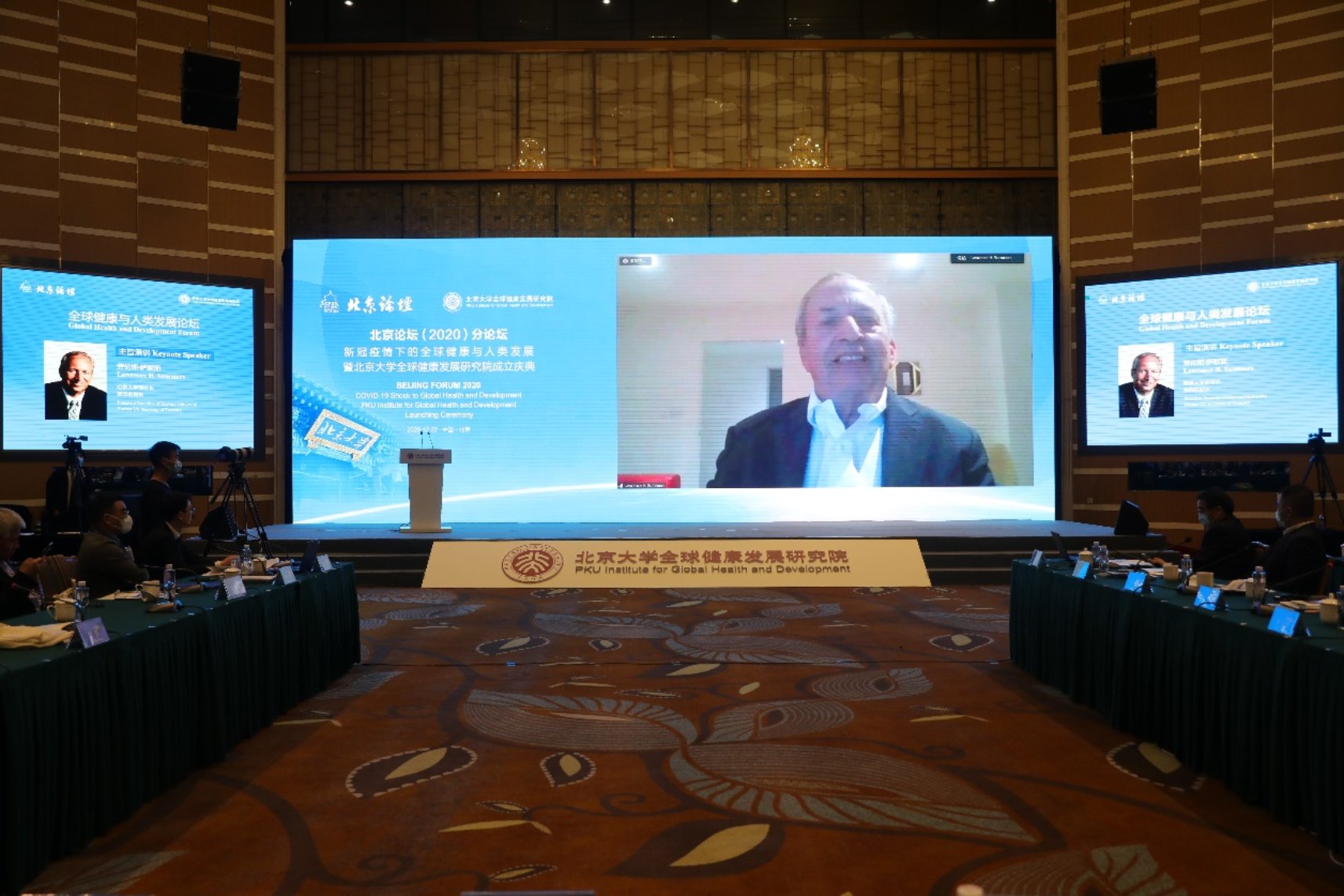
Lawrence H. Summers at Speech
Victor Dzau, president of US National Academy of Medicine, and former chancellor for Health Affairs of Duke University, emphasized that COVID-19 has demonstrated the importance of responsible leadership, engaged citizenship, agile systems and sustained investment. Multilateralism is the essential linkage at the center and global solidarity and equity are needed for all.
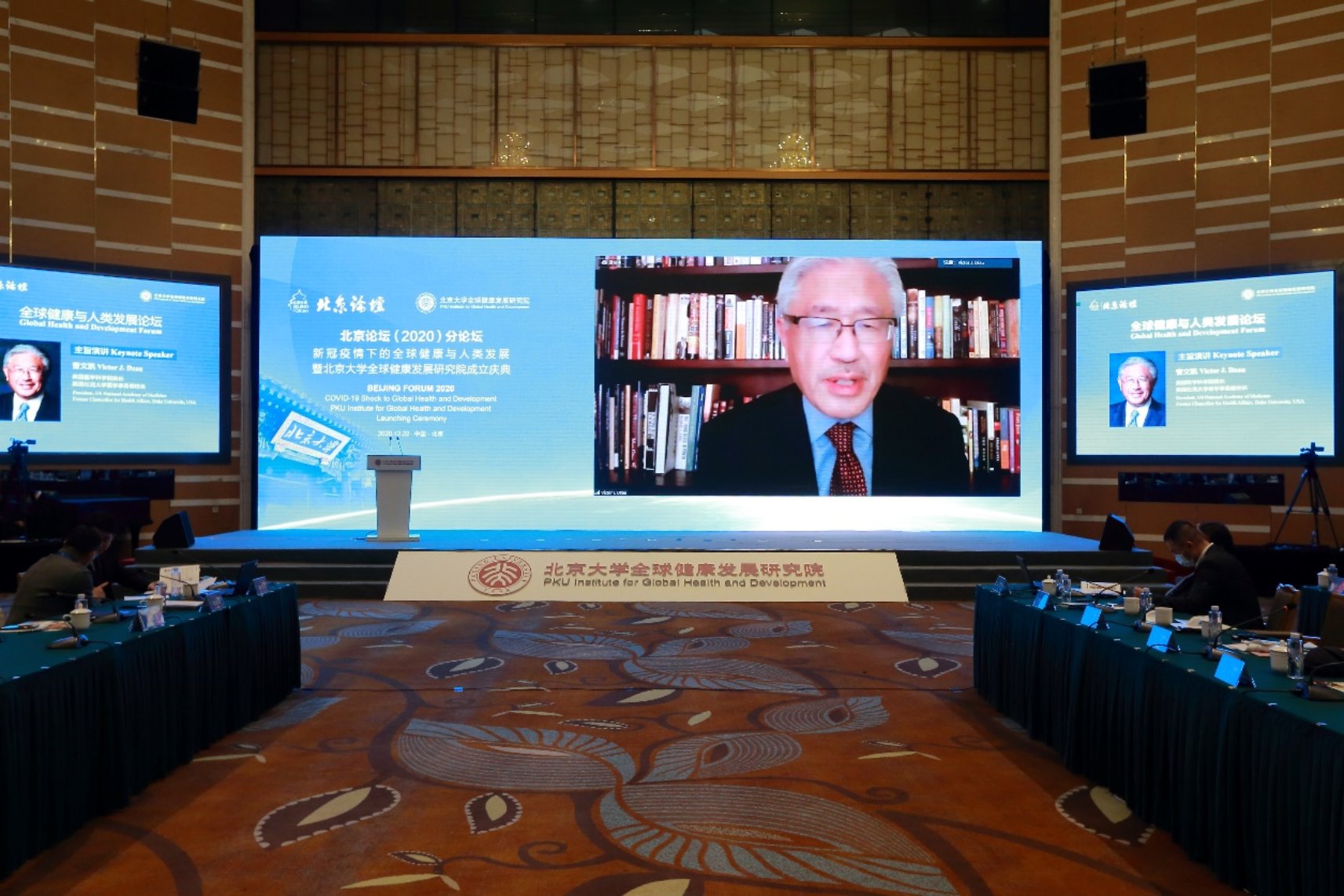
Victor Dzau at Speech
Jeffrey D. Sachs is professor of Columbia University and director of UN Sustainable Development Solutions. He laid out reasons for the superior performance of Asia Pacific countries in tackling COVID-19, and clarified on future priorities for 2021, which include comprehensive application of non-pharmaceutical interventions (NPI), scale up and equitable distribution of vaccines, support for low-and middle-income countries, etc. He pointed out that China has special opportunities in playing the leadership role in the global combat against the pandemic.
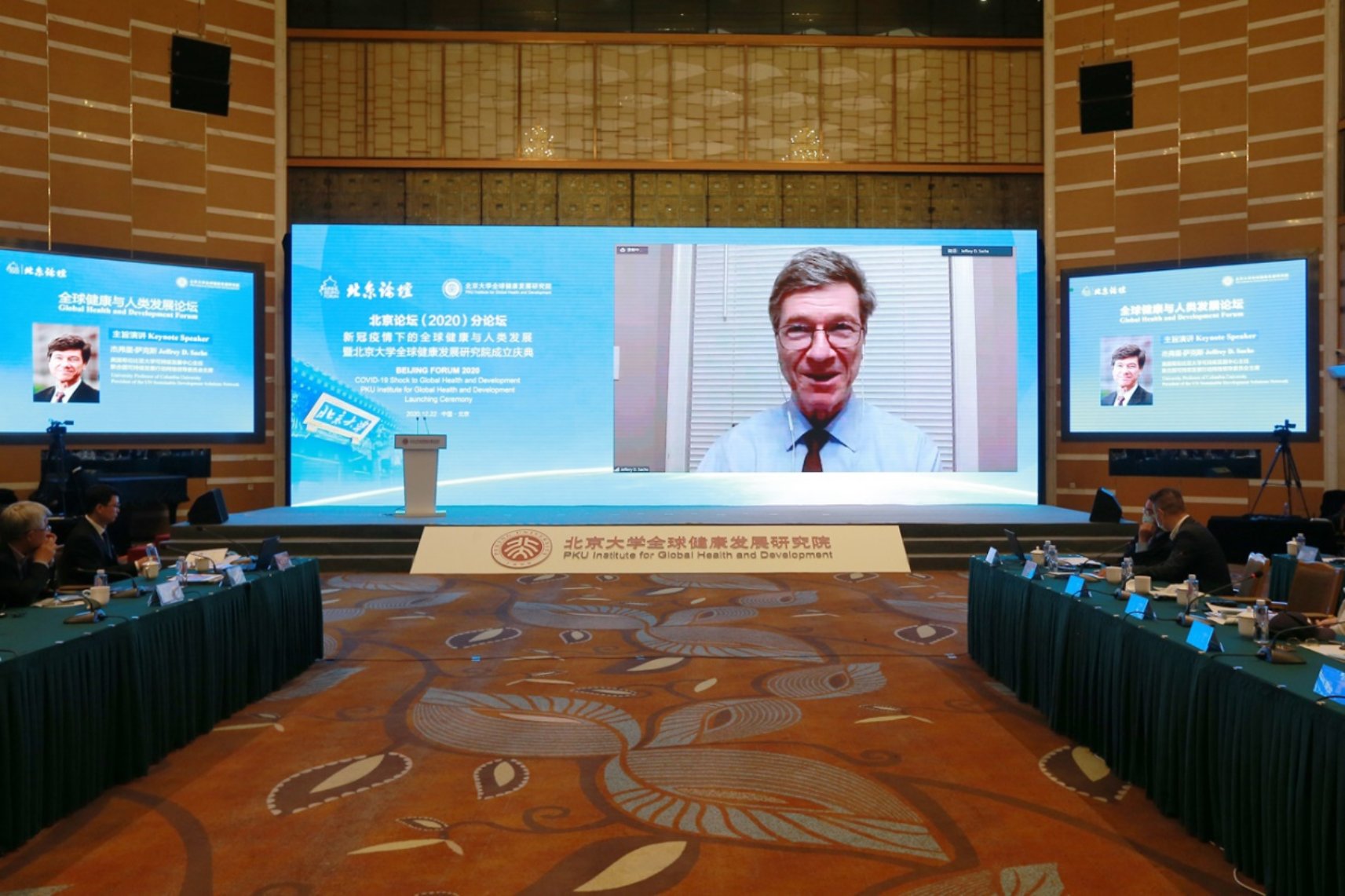
Jeffrey D. Sachs at Speech
George F. Gao, director-general of China Center for Disease Control and Prevention and member of Chinese Academy of Science, shared China's experience in fighting against the COVID-19 pandemic, and China's participation in the global health system. He proposed four principles of global collaboration on public health: cooperation, competition, communication and coordination.

George F. Gao at Speech
Steve Orlins is president of National Committee on US-China Relations. He made it clear that the future of US China relations will be determined by the people of each country. He hoped the pandemic could become a teaching moment for people to realize that only cooperation between the two countries can confront all the current and future global threats. He hopes PKU-iGHD can help facilitate the dialogue and cooperation in terms of health to the people of China and the US, and the people of the rest of the world can enjoy a healthy and bright future.
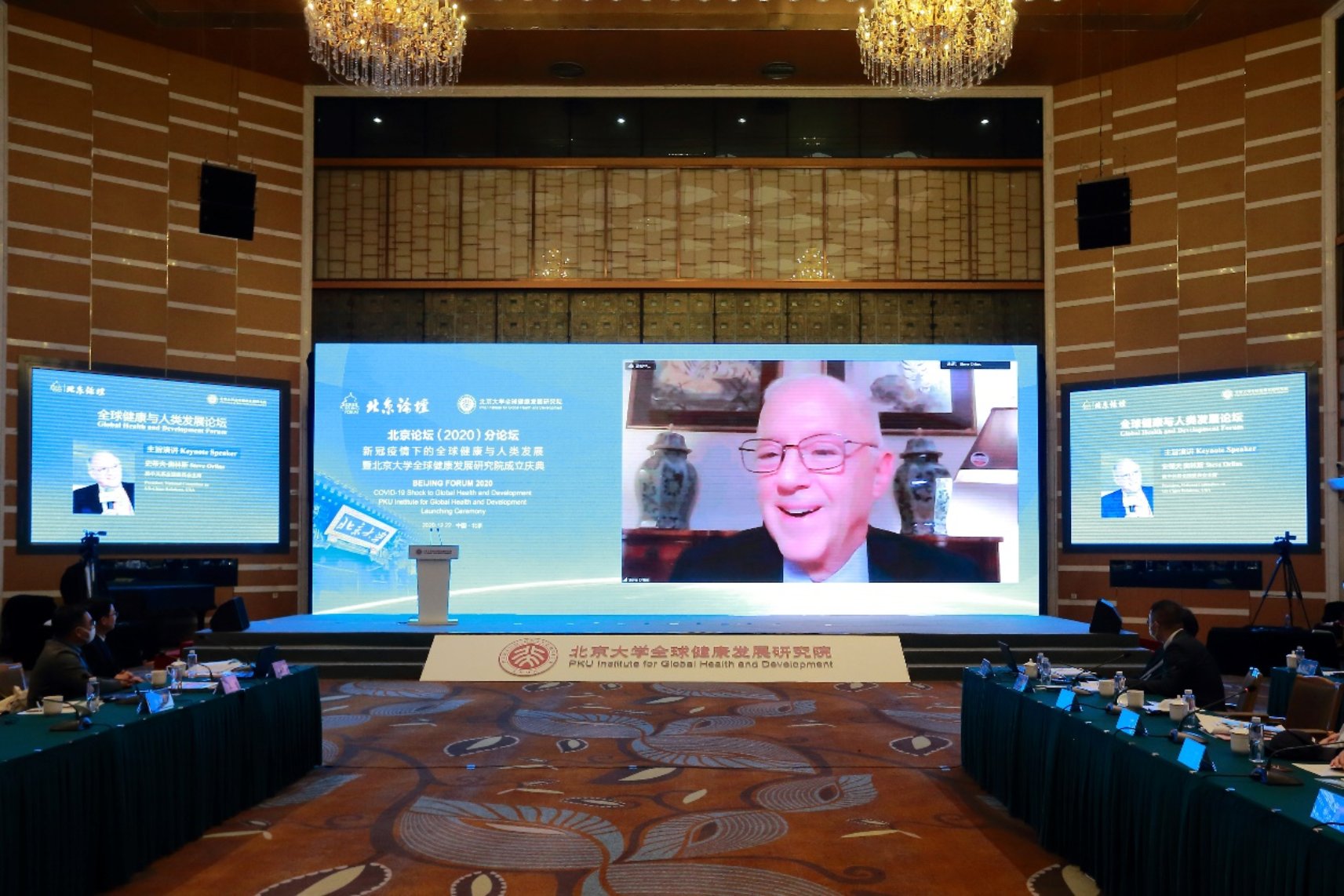
Steve Orlins at Speech
Dean Jamison, emeritus professor of Institute for Global Health Sciences of UCSF and principal investigator of Disease Control Priorities Network of the US, emphasized that speed can change the trend of the pandemic and will have a long-term impact. Rapid, collective and scientific response to the current and future pandemic is essential, and global cooperation and exchange should be strengthened.
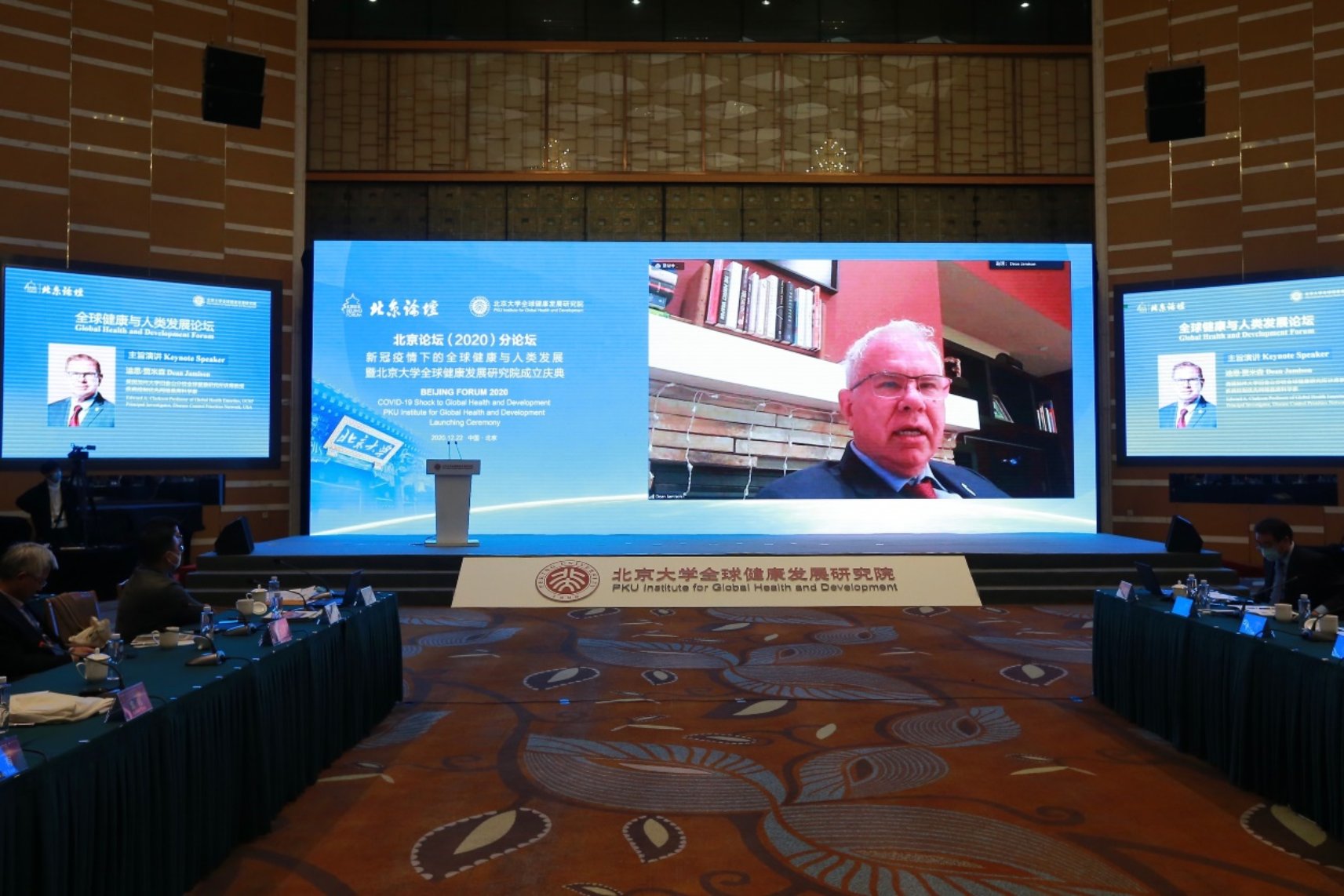
Dean Jamison at Speech
Roundtable Discussions
The roundtable discussions were moderated by Fu Jun, academic dean of the Institute of South-South Cooperation and Development, Peking University. Top scholars and experts from academic fields of public health, economics, management, and international relations and business world, shared their views and comments of the establishment of PKU-iGHD and the previous keynote speeches.
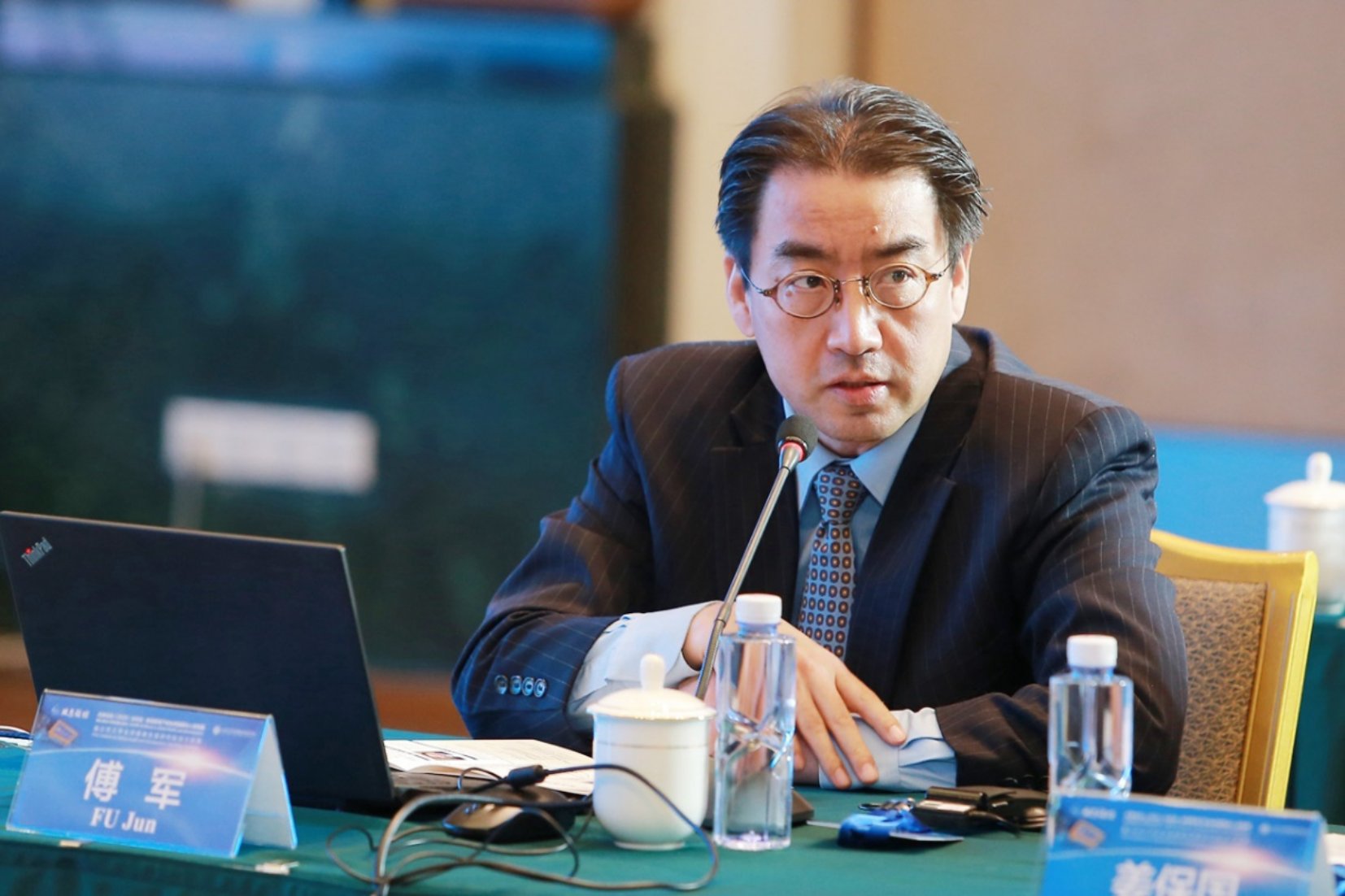
FU Jun Moderated the Round Table Disscussion
Commentators participating in the discussions included YUAN Ming, dean of Yenching Academy of Peking University, GONG Peng, vice president of the University of Hong Kong and dean of Tsinghua School of Science, GUO Yucheng, president of Chinese Health Association, HANTieru, president of Chinese Society of Global Health, Chinese Preventive Medicine Association, LIU Tingjun, president of Taikang Insurance Group, Meng Qingyue, dean of Peking University School of Public Health, ZHANG Haibin, associate dean of PKU-iGHD, ZHANG Weiying, BOYA distinguished professor of PKU National School of Development, and ZHENG Zhijie, associate dean of PKU-iGHD.
YUAN Ming, Dean of the Yenching Academy of Peking University, believes that the consequences of the pandemic are still unfolding, it is important to think about mental health, especially those young people left isolated uring the lockdowns. With this wake-up call that the Institute under the leadership of Gordon Liu, will take much longer and broader perspective and vision to see what kind of thing we have to face one and another.
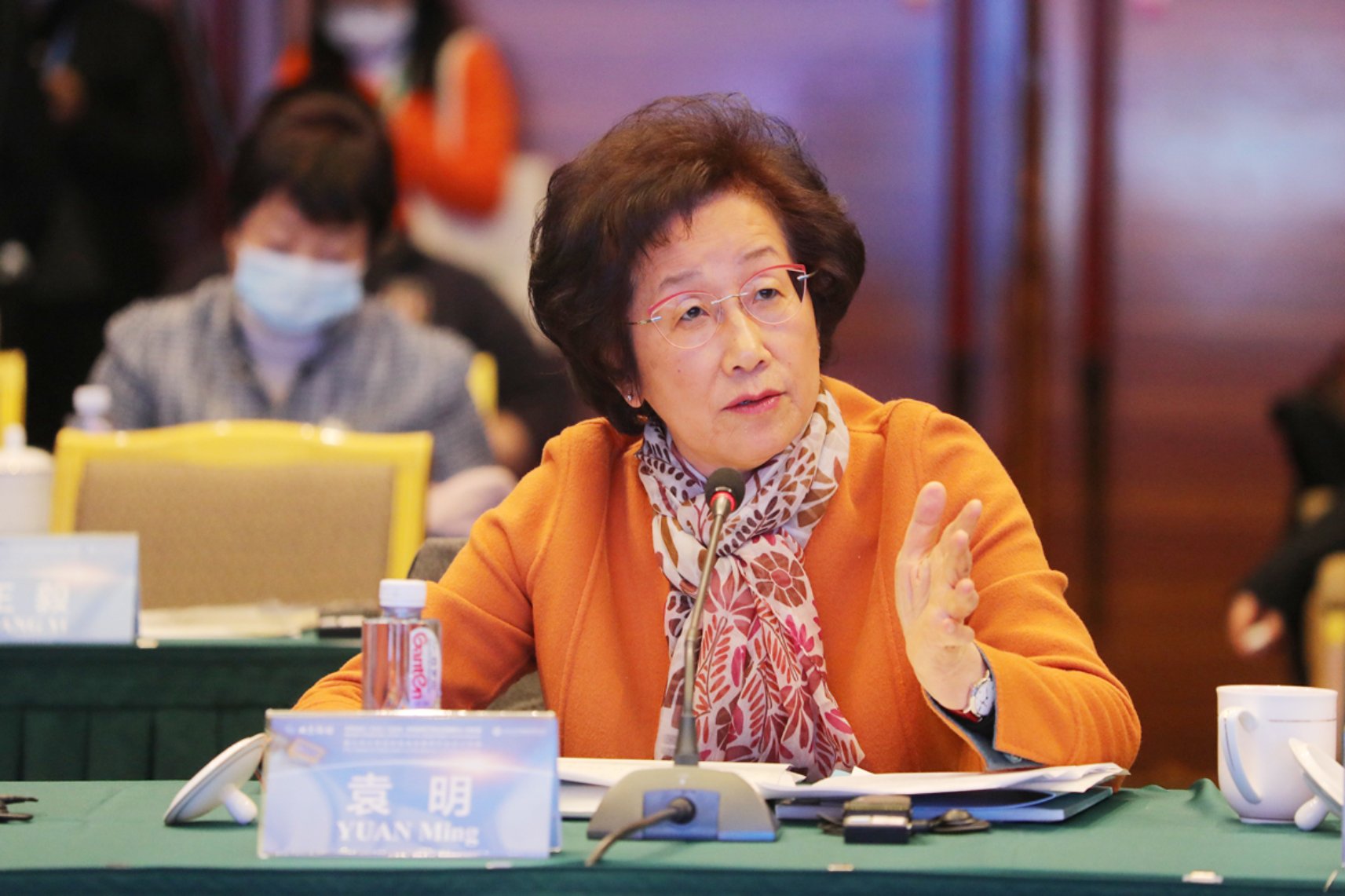
YUAN Ming talked at Roundtable
GONG Peng, Vice President of Hong Kong University, Dean, Tsinghua School of Science, suggested that: We are in the midst of globalization and global changes, health is an essential part of the global system. We need to have a global perspective for top-level designs, break academic disciplinary barriers, and use big data and systematic methods to study human health and development.
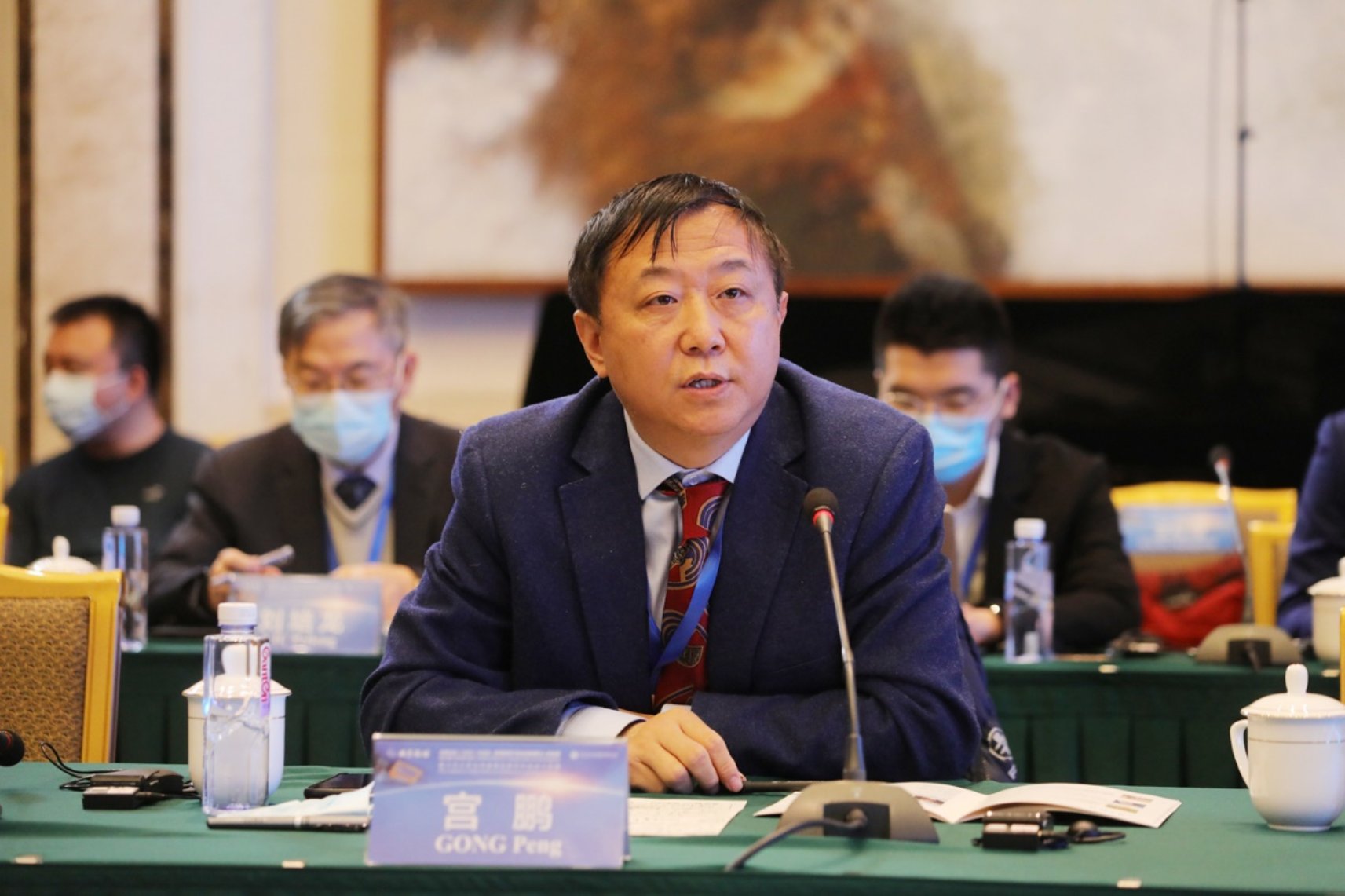
GONG Peng talked at Roundtable
HAN Tieru, President, Society of Global Health, Chinese Preventive Medicine Association, said that it is necessary to learn the lessons from the pandemic. In a global perspective, we need to strengthen the systems of disease control and prevention in all countries, and establish a global coordination and leadership mechanism. We should be aware of that chronic disease prevention and treatment are facing greater challenges in the context of the Covid pandemic; and It is very important of International strategic assistance for promoting global health development.

HAN Tieru talked at Roundtable
GUO Yucheng, President, Chinese Health Association, called for a high-level understanding of global health and human development as a community with a shared future for mankind. It is necessary to strengthen international cooperation, promote a comprehensive health security mechanism with the linkage of the country, societies, and individuals, and establish an integrated life-cycle system that including prevention, treatment and rehabilitation.

GUO Yucheng talked at Roundtable
HAO Weidong, Professor, Peking University School of Public Health, congratulated the Institute launching and he looks forward to working closely with colleagues of the new institute based on interdisciplinary advantages, and to help improve scientific research, educational teaching and social practice in the field of global health and development.
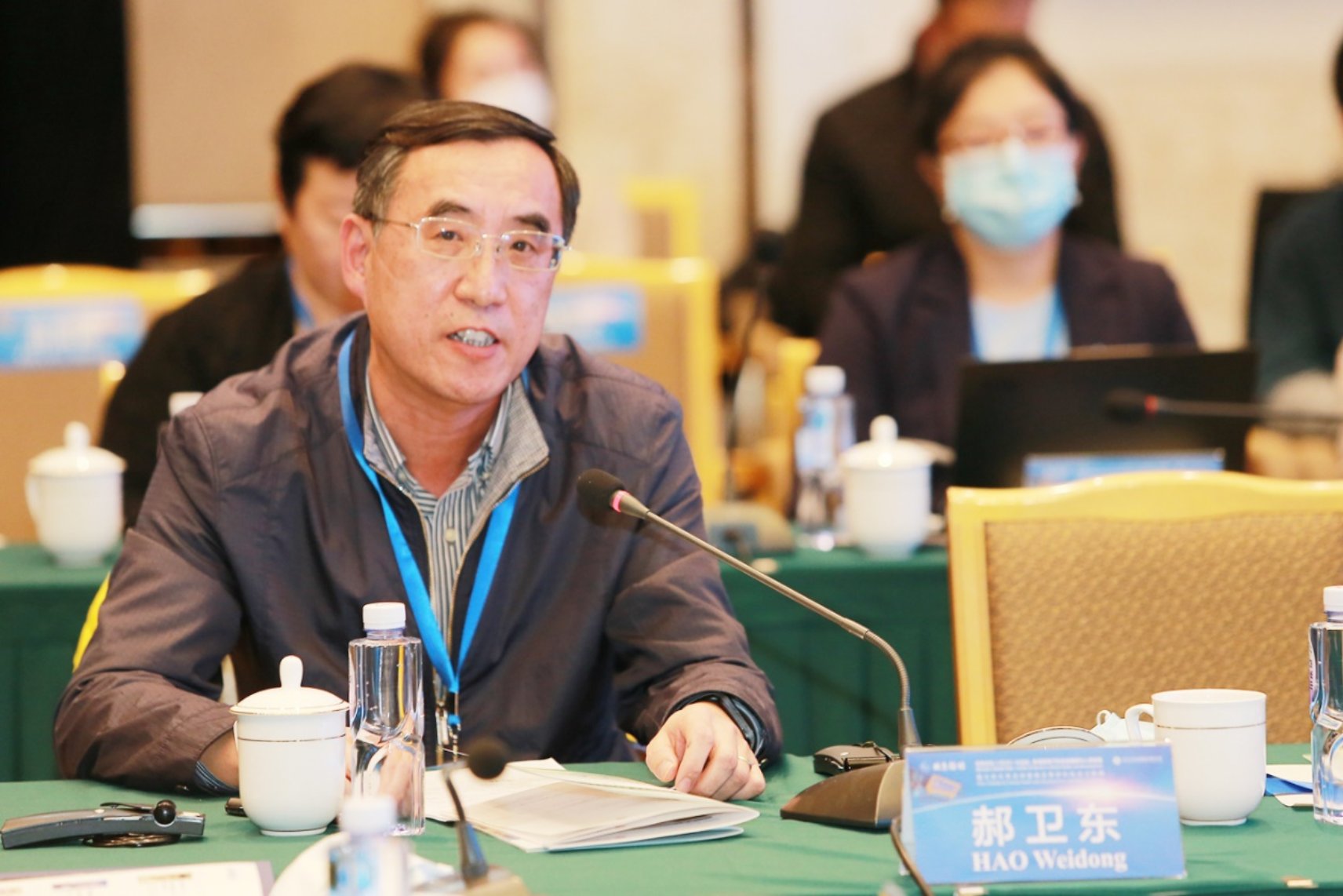
HAO Weidong talked at Roundtable
Liu Tingjun, President of Taikang Insurance Group, proposed: Not only must we face the challenges of COVID pandemic to the medical emergency, but also the threat of chronic diseases and aging; China's medical system is not highly market-oriented with insufficient services, and lack of product innovation. It is necessary to strengthen the integration of health research and medical practice, leverage market mechanisms and entrepreneurial spirits, and meet the higher demands of human development through innovation.
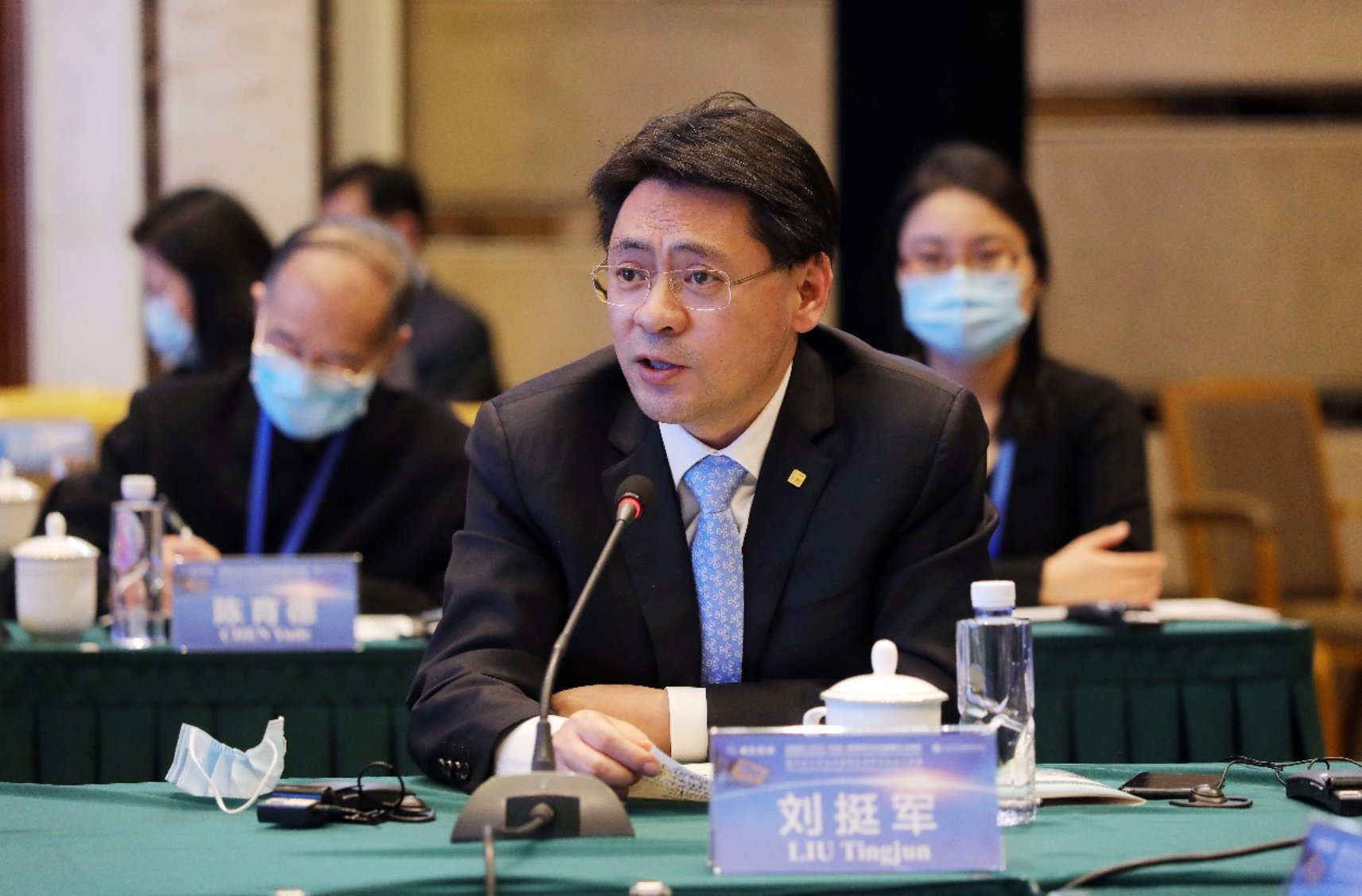
LIU Tingjun talked at Roundtable
ZHANG Haibin, Associate Dean, PKU School of International Relations, and PKU-iGHD, talked about the fact that the pandemic is a unprecedented challenge since WW-II, it is disorder between human being and nature and disorder between peoples and between nations. The world big powers should set good examples in global governance and non-state actors should play a greater important roles.
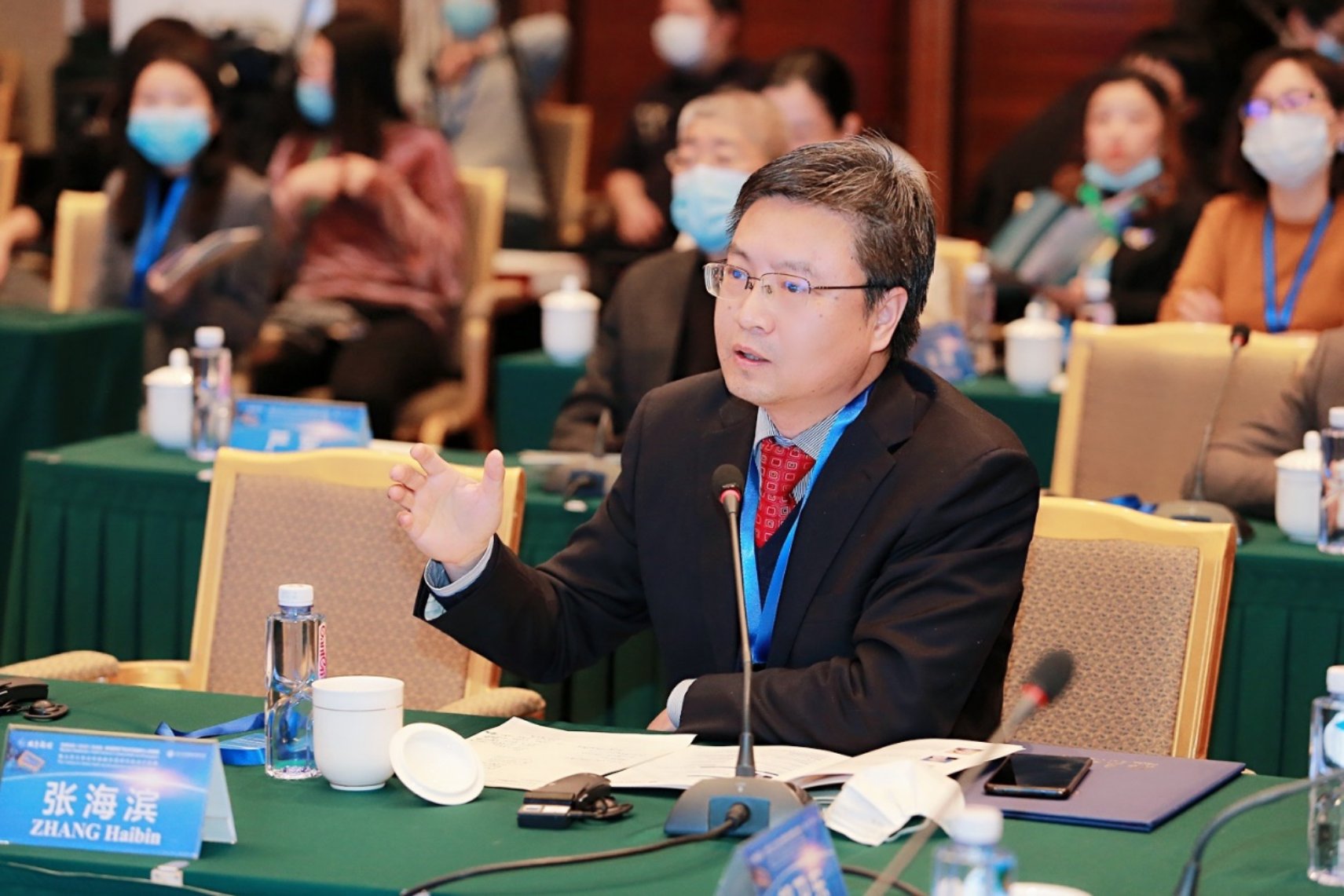
ZHANG Haibin talked at Roundtable
ZHANG Weiying, Boya Distinguished Professor, National School of Development at Peking University, pointed out that when mankind faces a common disaster, no one can be an exception. But in this epidemic, there are serious divisions among countries, and we need to rethink this issue seriously. I hope that the Institute should transcend the country, transcend politics, and become an envoy of peace.

ZHANG Weiying talked at Roundtable
ZHENG Zhijie, PKU K. C. Wong Chair Professor; Associate Dean, PKU Institute for Global Health and Development finally emphasized that the institute will make mid-and long-term strategic planning, set up managerial mechanism and improve multi-disciplinary constructions, and built a talent echelon. The Institute aims to promote world class innovative knowledge sharing, advanced talents training, and provide world-leading public goods.
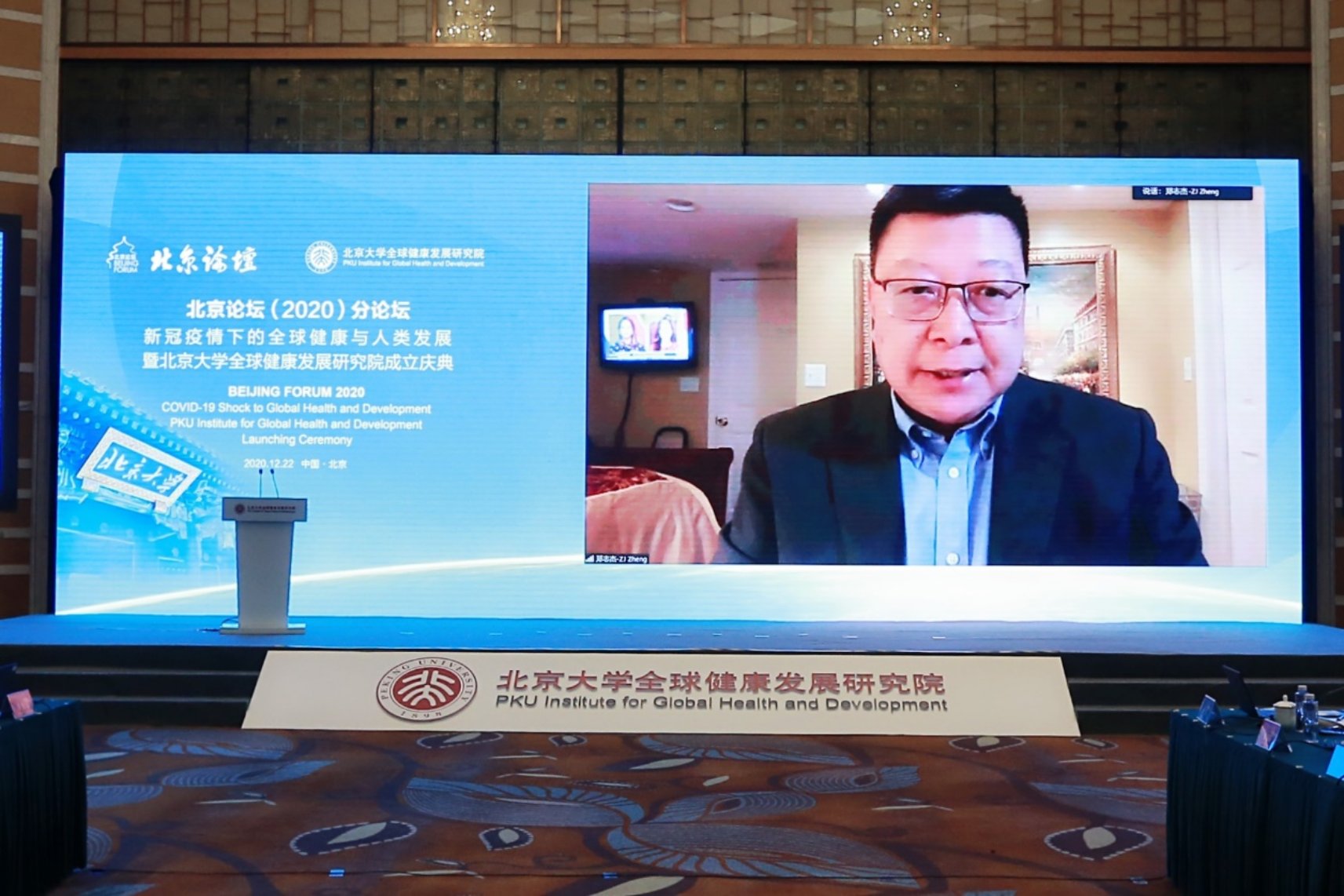
ZHENG Zhijie talked at Roundtable
Beijing Forum Held annually since 2004, co-organized by Peking University, Beijing Municipal Education Commission, and Chey Institute for Advanced Studies, the Beijing Forum, with the overarching theme of “The Harmony of Civilizations and Prosperity for All”, has gathered a wealth of invaluable suggestions and insights that have helped generate outstanding academic advancement in the Asia Pacific region and around the world.